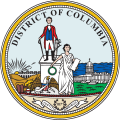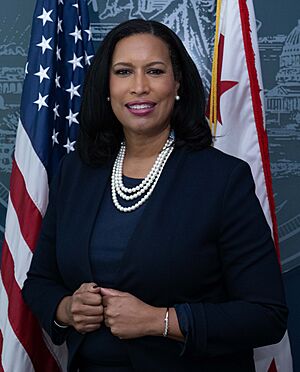Mayor of the District of Columbia facts for kids
Quick facts for kids Mayor of the District of Columbia |
|
|---|---|

|
|

Seal of the District of Columbia
|
|
| Government of the District of Columbia | |
| Appointer | Electorate of the District of Columbia |
| Term length | Four years, renewable with no limit |
| Inaugural holder | Walter Washington |
| Formation | 1973 |
| Salary | US$250,000 |
The Mayor of the District of Columbia is like the chief executive officer for Washington, D.C. This person leads the executive branch of the city's government. The mayor's main jobs include making sure district laws are followed. They also have the power to approve or reject new laws passed by the D.C. Council.
The mayor is in charge of many important city services. These include public property, police and fire departments, and most public agencies. They also oversee the public school system for the district. The mayor's office manages a large annual budget for the city. The main office is located in the John A. Wilson Building in Downtown D.C.. The mayor also chooses many important leaders for the city. These include deputy mayors, the district administrator, and the head of the public schools.
Contents
How D.C. Got Its Mayor
Early Days of Washington, D.C.
When the District of Columbia was officially created in 1801, it had different parts. These included three cities with their own governments and two rural areas. The City of Washington was one of these cities. It had its own mayors from 1802 to 1871.
At first, the U.S. President chose the mayor of Washington City. Robert Brent was the first mayor, picked by President Thomas Jefferson in 1802. Later, from 1812 to 1820, a special council chose the mayor. In 1820, a change allowed people to vote for the mayor. However, only white men who owned property could vote back then. The rule about owning property was removed in 1848. In 1867, Congress allowed Black men to vote too. During this time, the District of Columbia as a whole did not have a single leader like a governor.
Changes in Leadership (1871-1973)
In 1871, a new law brought all parts of the district together. This included Washington City, Georgetown, and Washington County. The office of mayor was removed. Instead, the district was led by a governor chosen by the President. After governors, a group of three commissioners ran the district until 1967.
In 1967, President Lyndon B. Johnson created a more modern government. It was led by a single commissioner, often called the "mayor-commissioner." There was also a nine-member council. All these leaders were chosen by the President. Walter E. Washington was the only person to hold this "mayor-commissioner" job.
The Modern Mayorship Begins
The Home Rule Act of 1973
In 1973, Congress passed the District of Columbia Home Rule Act. This important law allowed D.C. residents to elect their own mayor and a 13-member council. The first elections under this new system happened in 1974. Walter Washington, who was the "mayor-commissioner," was elected as the first home-rule Mayor of the District of Columbia. He started his term on January 2, 1975. This was the first time in over 100 years that D.C. had a leader chosen by its own people.
Challenges and Progress
After Walter Washington, Marion Barry became mayor in 1979. His time in office faced criticism for how the city's money was managed. After facing legal issues, he did not run for reelection in 1990. In 1991, Sharon Pratt Kelly made history as the first woman to lead the district.
Marion Barry was elected mayor again in 1994. By 1995, the district was facing serious money problems. To help, Congress created the District of Columbia Financial Control Board. This board oversaw all city spending to help the government recover. Mayor Anthony Williams was elected in 1998. His time as mayor brought more success, city improvements, and extra money in the budget. The district regained control of its finances in 2001.
Williams did not seek reelection in 2006. Councilmember Adrian Fenty became mayor in 2007. He worked to improve the public school system. However, Fenty lost the next election to Vincent Gray in 2010. Mayor Gray promised to bring more economic chances to all parts of the district. Gray then lost the 2014 election to Councilmember Muriel Bowser. She won the general election and was reelected in 2018 and 2022. This made her only the second person to serve three terms as Mayor of the District of Columbia.
Today, the mayor of the District of Columbia is chosen by voters for a four-year term. There is no limit to how many terms a mayor can serve. Even though D.C. is not a state, its government has some responsibilities like a state government. This means the mayor's duties are similar to those of state governors.
How Mayors Are Elected
Voting for the Mayor
The mayor is elected every four years. There are no limits on how many times a person can be re-elected. To be a candidate, a person must have lived and been registered to vote in D.C. for at least one year before the election.
Elections happen in November, at the same time as the midterm Congressional elections. Most voters in D.C. are Democrats. This means the mayor is usually decided in the Democratic primary election. This primary election is held on the second Tuesday in September.
Taking the Oath
The mayor officially starts their term on January 2 after the election. They take an oath to promise they will do their job well. The oath says they will faithfully follow the laws of the United States and D.C. They also promise to protect the U.S. Constitution and carry out their duties as mayor.
What Happens if the Mayor's Office is Empty?
If a mayor leaves office due to death, resignation, or being unable to do their job, the chairman of the D.C. Council becomes the acting mayor. This happens if the mayor did not name someone else to take over. The chairman serves until a special election can be held. This special election must happen at least 114 days after the mayor's office becomes empty. It is held on the first Tuesday after that time. As of July 2025, this situation has never happened.
Mayor's Responsibilities and Powers
The mayor has many important jobs and powers. They must make sure all district laws are followed. They also manage and coordinate all city departments. This includes choosing a District Administrator and the heads of departments, which the council must approve.
The mayor also sets policies and plans for the council. They prepare and submit the city's budget at the end of each year. The mayor can approve or reject laws passed by the D.C. Council. They can also suggest new laws to the council. The mayor can even propose federal laws or actions directly to the President or Congress.
As the head of the city's executive branch, the mayor can create and put into action executive orders. These orders relate to the departments and officials they oversee. They can also reorganize parts of the executive branch. However, the council can formally disagree with these changes. The mayor also has the right to speak to the council or any of its committees.
See also
- List of mayors of Washington, D.C.
- Timeline of Washington, D.C.


